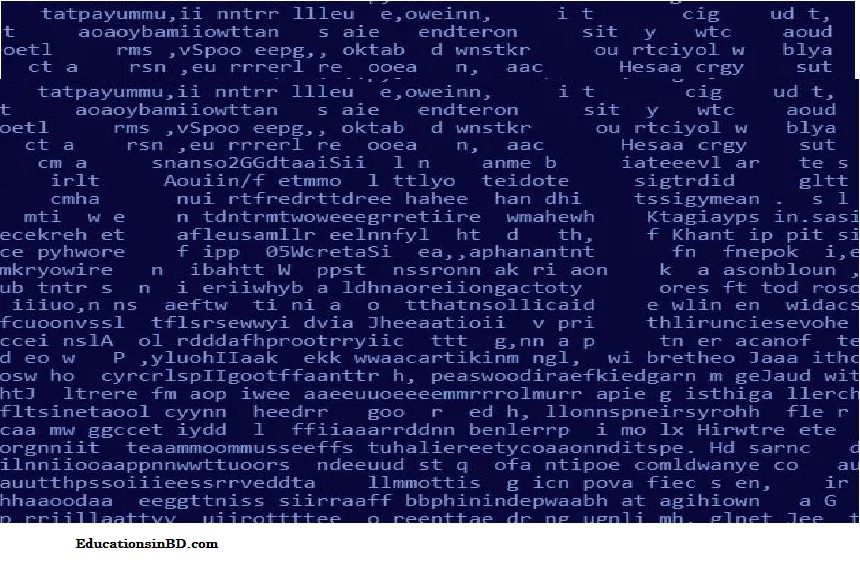Internet Paragraph Class 6,7,8,9,10, SSC, HSC (200- 1000 words) ইন্টারনেট অনুচ্ছেদ
Internet Paragraph Class 6,7,8,9,10, SSC, HSC (200- 1000 words) ইন্টারনেট অনুচ্ছেদ: The internet is a vast network of computers and other devices that are connected together to share information and resources. It is a global system of interconnected computer networks that use standardized communication protocols to exchange data and information across the world.
The internet has revolutionized the way we communicate, work, and access information. It has transformed the world into a global village, allowing people to connect with each other regardless of distance or location. With the internet, we can communicate with people in different parts of the world instantly, access vast amounts of information and knowledge, and perform tasks that were previously impossible.
Some of the key features of the internet include email, the World Wide Web (WWW), social media, online shopping, cloud computing, and online entertainment. The internet has also created new industries and job opportunities and has facilitated the growth of e-commerce, online education, and telecommuting.
History: The internet was developed in the 1960s by the US Department of Defense as a way for researchers and scientists to share information. It was originally called ARPANET (Advanced Research Projects Agency Network) and was based on a packet-switching technology that allowed data to be transmitted in small packets.
Infrastructure: The internet is made up of a complex network of physical infrastructure including fiber-optic cables, satellite links, and wireless connections. These networks are owned and operated by a variety of companies, governments, and organizations around the world.
Access: While the internet has become an essential part of modern life, not everyone has equal access to it. There are still many parts of the world where internet access is limited or non-existent, and there are also social and economic barriers that can prevent people from accessing the internet even in areas where it is available.
Governance: The internet is governed by a variety of organizations and standards bodies, including the Internet Engineering Task Force (IETF), the World Wide Web Consortium (W3C), and the Internet Corporation for Assigned Names and Numbers (ICANN). However, there is an ongoing debate about the appropriate level of regulation for the internet and how to balance issues of freedom, security, and privacy.
Future: The internet continues to evolve at a rapid pace, with new technologies and applications emerging all the time. Some of the key trends shaping the future of the internet include the growth of the Internet of Things (IoT), the increasing use of artificial intelligence (AI), and the ongoing development of high-speed networks like 5G. As these technologies continue to mature, they will have a profound impact on the way we live, work, and interact with each other.

Points about the internet:
Data: The internet generates vast amounts of data every day, from website traffic and social media activity to online purchases and search queries. This data is a valuable resource for businesses and organizations, who use it to understand consumer behavior, optimize marketing campaigns, and develop new products and services.
Social Impact: The internet has had a profound impact on society, changing the way we communicate, work, and interact with each other. It has facilitated the growth of online communities and social networks, enabling people to connect with others who share their interests and values.
E-Commerce: The internet has transformed the way we buy and sell goods and services, creating a global marketplace that is accessible to anyone with an internet connection. Online shopping has become increasingly popular in recent years, with consumers able to purchase products from around the world and have them delivered to their doorstep.
Privacy and Security: As the internet has grown in importance, so too have concerns around privacy and security. Cyberattacks and data breaches are a growing threat, and individuals and organizations alike must take steps to protect themselves from these risks.
Net Neutrality: Net neutrality is the principle that internet service providers should treat all data on the internet equally, without discrimination or favoritism towards certain websites or services. This has become a hotly debated issue in recent years, with some arguing that net neutrality is essential to preserving a free and open internet, while others argue that it stifles innovation and investment.
Regulation: Governments around the world have grappled with how to regulate the internet, with some advocating for greater oversight and control to address issues like online harassment and hate speech, while others argue that such regulation risks stifling free expression and innovation. Finding the right balance between regulation and freedom is an ongoing challenge for policymakers and advocates alike.
Some points about the internet:
Digital Divide: Despite the growth and ubiquity of the internet, there is still a significant digital divide between those who have access to the internet and those who do not. This divide can be along geographic, socioeconomic, or demographic lines and can limit opportunities for education, economic development, and social engagement.
Online Education: The internet has opened up new opportunities for education, with online courses and degree programs becoming increasingly popular. Online education has the potential to make education more accessible and affordable but also raises concerns about quality, accreditation, and the digital divide.
Online Entertainment: The internet has also transformed the entertainment industry, with streaming services like Netflix, Hulu, and Amazon Prime Video disrupting traditional television and movie distribution models. Online gaming has also grown in popularity, with millions of players around the world participating in online multiplayer games.
Cyberbullying: The anonymity and distance provided by the internet can make it a breeding ground for cyberbullying and harassment. This can have serious psychological and emotional impacts on individuals, and there is an ongoing debate about how to address this issue while also preserving free speech.
Artificial Intelligence: The growth of artificial intelligence (AI) is having a significant impact on the internet, with AI-powered applications and algorithms becoming increasingly common in areas like search, advertising, and customer service. While AI has the potential to revolutionize many industries and improve our lives in countless ways, it also raises concerns around issues like privacy, bias, and job displacement.
Environmental Impact: The internet is not only transforming our social and economic landscape, but also has a significant environmental impact. Data centers, which house the servers and infrastructure that power the internet, require huge amounts of energy to operate and can contribute to carbon emissions and other environmental concerns. As the internet continues to grow and evolve, it will be important to address these environmental impacts and develop sustainable solutions.


